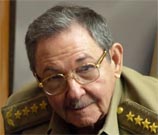Travel: The great longing in a changing Cuba
 Havana - Hopes have spread like wildfire in recent days for elimination of the "white card" - the exit permit required to leave Cuba and one of the main hurdles for Cubans longing for travel - amid a wave of reform under new Cuban President Raul Castro.
Havana - Hopes have spread like wildfire in recent days for elimination of the "white card" - the exit permit required to leave Cuba and one of the main hurdles for Cubans longing for travel - amid a wave of reform under new Cuban President Raul Castro.
Computer specialist Javier, 26, cannot wait to get out of the communist island.
"The main reason is the economy, and behind that economy there is the system that we have in our country," he said.
Soon there may be fewer barriers to stop him.
In a framework of change on the island, the former high official of Cuban intelligence Pedro Anibal Riera Escalante last week proposed a bill to the National Assembly to "totally eliminate" entry and exit permits as well as the practice of confiscating the possessions of those who leave the country, among other issues.
It came as no big surprise, because Foreign Minister Felipe Perez Roque has admitted in recent months that authorities were "considering" such a move.
Despite recent reforms, Javier - who wants to travel to the United States - is beset by deep frustration.
"Raul (Castro) is making changes, but they have not yet reached working people, the people who have studied, who have made sacrifices, who everyday give their sweat and their sacrifice to lift this country, in accordance with this ideology that they created for us," he complained.
However, not all Cubans who want to travel more easily are looking to leave for good.
"Cubans have a great need to know the world, to travel, to have opportunities," said Charly, a young actor from Havana who noted that he just wants to "make contact with other artists."
The video footage leaked to foreign media earlier this year, showing an internal meeting of handpicked computer science students, gave a window on the travel longing among Cubans.
"Why do the Cuban people not have a feasible possibility to get to certain places in the world? Me, I do not want to die without going to the place where Che (Guevara) died, there in Bolivia," the student, Eliecer Avila, asked National Assembly Speaker Ricardo Alarcon.
Alarcon had trouble finding a satisfactory answer for the student.
Even one of Cuba's most internationally famous songwriters, Silvio Rodriguez, who can be accused of anything but dislike for the Cuban regime, recently said that the exit permit requirement "should be abolished."
"It has survived too many years in Cuba, and I do not think it is justified," Rodriguez said.
For now, despite the talk, there are no extra queues to obtain passports, exit permits, legalized invitation letters and all the other papers necessary for Cubans to try to get out. These documents cost a fortune, some 500 dollars for the lot - for an average monthly salary of 17 dollars in Cuba - with no guarantee that a permit will be granted.
However, it seems likely that the demand for passports will grow when migration rules become more flexible.
"People have the will to get out anyway. It would just become easier. That would be very good," said Andres, a man from Havana who was doing the paperwork in order to travel.
One measure of the desire - and need - to travel is the increasing number of Cubans who, unable to get out legally, try to do it any other way possible.
Almost 11,000 Cubans tried to reach the United States illegally in the last six months, sources at the United States Interests Section in Havana said earlier this month. Of these, 2,891 attempted to cross the Straits of Florida, and the rest arrived at airports or the US borders with Mexico and Canada.
Another factor that US figures illustrate is a particularly serious problem for Cuba: the majority of those Cubans "intercepted" as they tried to reach US shores were aged 18-35 - the future of the Cuban economy.
That is at the core of the debate. Cuba has restricted travel to prevent the dreaded brain drain, an issue that former Cuban leader Fidel Castro has repeatedly addressed.
"The unfair US policy against our country has deprived us of 5.16 per cent of the professionals graduated under the revolution," Castro said last year.
Dissident economist Oscar Espinosa rejects this argument, noting that Cuba's really serious problem is that "the country's human capital is hugely underused."
"The most able people are not always those who live best, and it is that which needs to be changed, not preventing people from leaving. That could even reverse the trend and encourage many Cubans to return," he said.
As they await official confirmation of the rumours, many Cubans are getting ready to update their travel documents.
"Now I am requesting a passport," Regla said.
She has Spanish ancestors and would not even need a visa in case she decided to go. (dpa)